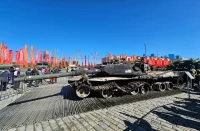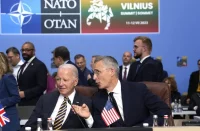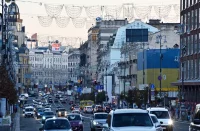International reaction to the results of the referendum and Venezuela’s steps followed immediately. First of all, Georgetown mobilized troops and the country’s President Irfaan Ali confirmed his willingness to defend the territorial integrity of the state in close cooperation with allies (mainly the United States). However, when Western media began to compare the army forces of Guyana and Venezuela, the comparison was not in favor of the former colony of the British Empire by all means. Venezuela turned out to be superior to Guyana both in terms of any weapons and personnel.
If the Venezuelan army were to enter Esequiba, Brazil and the United States would highly likely intervene in the conflict. They absolutely do not need military escalation in the region. For Brazil, this is one of its closest neighbors with the entire southern border of the United States teaming with migrants and the Biden Administration having absolutely no idea what to do with them. They have no need for new waves of migrants. However, if the conflict escalates, they will certainly happen. As a result, the United States publicly took a stand against active military actions and announced joint military exercises with Guyana and the Brazilian Ministry of Defense increased its troops on the border with Venezuela.
At the same time, it is necessary to be aware that a military action by Caracas would most likely spark a negative international reaction. Moreover, Caracas will not survive in a confrontation with the United States and Brazil. There is absolutely no need for Maduro for such a thing to happen. All he needs at the current stage is to win the elections which is what he is going for. Russia and China, two strategic partners of the Bolivarian Republic, have also called for finding a peaceful solution to the territorial dispute.
This is what Caracas obviously counted on. Once a danger of escalation emerged, the foreign ministers of the two countries had a telephone conversation that confirmed their commitment to finding a peaceful solution to the territorial dispute. However, with the crisis likely to enter its acute phase, Georgetown’s position also changed and became more flexible regarding dialogue with Caracas on the future of Esequiba.

Brazilian President Lula da Silva considerably contributed to addressing the acute phase of the crisis and bringing the parties to the negotiating table. He acted as a mediator between the leadership of both countries and organized a platform for negotiations. Such an approach on the part of the leader of Brazil to resolving the regional conflict directly suits the interests of the country as a regional power one of whose key tasks is active mediation in negotiations and resolution of disputes in Latin America. This strengthens Brazil’s international position, which is one of the goals of the Lula da Silva Administration’s foreign policies.
Those very well-thought-out actions on the part of both President Nicolas Maduro of Venezuela and President Lula Da Silva of Brazil resulted in direct negotiations between the leaders of Venezuela and Guyana that took place on December 14, 2023 in Kingstown, the capital of small Caribbean state of Saint Vincent and the Grenadines. Their result is quite logical and did not surprise anyone, a declarative statement about the commitment to resolving the dispute diplomatically and inadmissibility of the use of force.
Put it otherwise, further escalation of the conflict has been stopped. The presidents agreed to hold summit talks with the mediation of Lula da Silva in Brazil and set up a joint committee to resolve controversial issues. However, despite the parties’ desire to resolve the conflict through diplomatic methods on its face, the countries’ main stances on key issues remained unchanged.
The negotiations that took place in Kingstown are not a final point in resolving the conflict but just a small comma in a long-term process. Why long-term? The situation is actually a stalemate with Venezuela not willing to retreat and Guyana being supported by the international community and, most importantly, the United States. Nevertheless, the start of the direct negotiation process is a positive signal that South America may become one of the zones of stability in our unstable times in the future.
The plebiscite held in Venezuela and its outcomes have shown, on the one hand, the unity of society on the issue of annexing Esequiba but at the same time its polarity in relation to the domestic policy of the President of Venezuela. Judge for yourself: Although willing to use this precedent to his advantage in the upcoming elections, Nicolas Maduro cannot help but realize that further escalation is not in his interests. It is doubtful that citizens would vote for the President who sparked a war. Will he be able to sufficiently manipulate popular support on the Esequiba issue to once again secure a win in the upcoming Presidential elections? This is seemingly the main question for Venezuela.
As for Guyana, the commencement of the negotiation process has already been perceived as some kind of diplomatic victory. In the author’s opinion, it’s somewhat reckless even despite the fact that President Irfaan Ali of Guyana managed to prevent the escalation of the conflict through diplomatic efforts with virtually no concessions in return. But was it his merit? Rather, Maduro himself did not opt for further escalation since he simply does not need it and, conversely, from the perspective of domestic politics and objectives 2024, a military conflict, even if won, may turn out to be a loss on the domestic political front for the authoritarian leader. A reasonable ruler would not want and will not risk his power. And despite all his eccentricities, Maduro has always been famous for his pragmatism.
Interestingly, Brazil became the main beneficiary of the unexpected conflict. Lula da Silva strengthened the position of his country by quickly joining the dispute between two neighboring countries as an arbiter and, most importantly, was able to bring them to the negotiating table. The President of Brazil managed to drastically subside tensions in the region and much will depend on whether this arbiter will be able to maintain his role in resolving this territorial dispute in the future.














This is a very bias article, which is no surprise coming from the guts if the hegemon itself. The oul hungry hagemon, to be clear. President Maduro has not escaöazed any situation, but the presence of tha british warship right next to the coast of Venezuela. It is Pres. Maduro’s obligation to watch for the security of the country borders.
It is very surprising that this page publishes such an article.